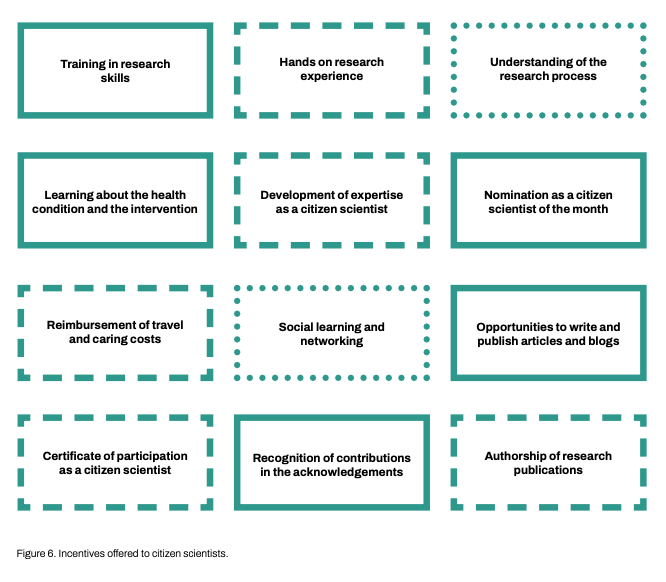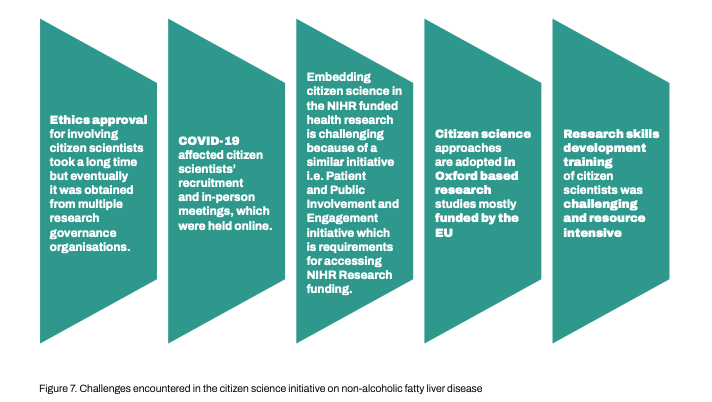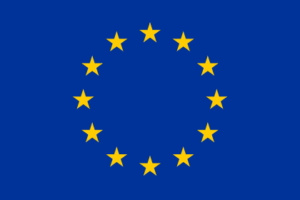Authors: Cerrato S., Balli E.
Cerrato S., Balli E. (2024), The Step Change Navigator, ECSA, Berlin
Non-alcoholic fatty liver disease | United Kingdom
This section embarks on a journey to explore the NIHR Oxford Biomedical Research Centre’s investigation into non-alcoholic fatty liver disease (NAFLD). This research, conducted in Oxfordshire, En- gland, where over half the adult population grapples with being overweight or obese, utilises a citizen science approach to shed light on this prevalent health concern.
Charting the course
The research team, led by the Oxford Centre for Diabetes, Endocrinology and Metabolism, seeks to unlock the secrets of steroid hormones and their role in the development, assessment, and treatment of metabolic diseases like NAFLD.
A translational expedition
This citizen science initiative serves as a translational experiment in the field of metabolic endocrinology. Its primary mission is to gain a deeper understanding of diurnal variations in hepatic lipid metabolism among overweight individuals under different conditions. The project also includes a lifestyle interven- tion involving a weight loss program.
Relevance and impact
This research holds particular relevance for the region, given the high prevalence of overweight and obese individuals in Oxfordshire.
Defining our objective
The project set out to explore the adoption of a citizen science approach within the realm of metabolic endocrinology. This involved conducting a translational medicine research experiment focused on NAFLD, incorporating a 12-week lifestyle and weight loss intervention.
Assembling the crew
The citizen science initiative brought together a diverse crew of 24 participants, including individuals with and without NAFLD, alongside approximately six citizen scientists. The recruitment of these citizen scientists, a crucial element of the project’s success, utilised various channels, as detailed in Figure 4.

For further in-depth information on the methodological details of this citizen science initiative, you can refer to the publication by Shah et al. (2023) in the “Citizen Science Theory and Practice Journal.”
Citizen scientists’ activities
Citizen scientists were involved in different research activities as shown in Figure 5 below. However, before embarking on their research voyage, the citizen scientists received essential training to ensure they were well-equipped. This training focused on research skills development, particularly in the areas of biomedical research ethics and data analysis, encompassing both quantitative and qualitative aspects.

Learning the ropes
During the final participatory evaluation workshop, the citizen scientists expressed their satisfaction with their participation and immense appreciation for the research skills development training provided. These training sessions fostered positive and productive relationships between the citizen scientists and professional researchers, ultimately boosting motivation and engagement in the project.
Unveiling personal treasures
The citizen scientists reported a sense of significant personal benefit from participating in the research, expressing a strong willingness to contribute to future health research projects. However, they highlighted the need for sustainable structures and mechanisms to facilitate ongoing citizen involvement in research initiatives.
Valuable cargo
To sustain participation, retention, and interest throughout the project, the citizen scientists received various incentives, which they found valuable and motivating.

Navigating challenges
While the project yielded positive outcomes, involving citizen scientists also presented challenges. This section dives into the key challenges encountered, as illustrated in Figure 7.

Unforgettable moments
“It was really nice to get a refresher on going through the basics of statistics and working up to actually applying… I found that intere- sting. I would like to learn more about that as well. For me, I felt in a way that I was given a lot. I perhaps would like to have done more back. Really positive experience. Very positive. The meetings were always, you know, very useful.”
“Lots of new knowledge and lot of learning. I also would like to give back more. I don’t have the science background… when I learned about this. I can do this. I can be part of a scientific project. It was like, wow!”
“The training was brilliant… First of all, it was great the fact that it was offered and being offered because those you were all in different parts of the country or even abroad. So that was nice. I introduce myself as citizen scientist rather than PPI member.”
Charting a new course: reflections and recommendations
Lessons learned
The NAFLD citizen science initiative serves as a beacon, illuminating the value of collaborative research practices. It demonstrates the tremendous potential of citizen scientists’ involvement in health research, particularly in harnessing their experiences, expertise, knowledge, skills, and perspectives. This collaborative approach fosters the co-creation of scientific knowledge, enriching the research journey.
Navigating uncharted waters
However, the project also steers us towards uncharted waters, highlighting the challenges of widespread adoption of citizen science within the realm of clinical research. The strict regulatory landscape and ethical considerations surrounding patient privacy in the United Kingdom present significant hurdles. These headwinds pose a substantial challenge to integrating citizen science seamlessly into clinical research practices.
Finding new horizons
Despite these challenges, the path forward is not entirely shrouded in mist. The potential for integrating citizen science with existing initiatives, such as the patient and public involvement agenda in health research, presents an exciting avenue for exploration. By charting a course that leverages existing frameworks and prioritises ethical considerations, we can work towards a future where citizen science plays a more prominent role in shaping and advancing clinical research within the UK healthcare system.
User Type
- Citizen scientist/civil society organization
- Researcher/research institution
Resource type
- Case studies
- Projects/project examples
Research Field
- Medical and Health Sciences



